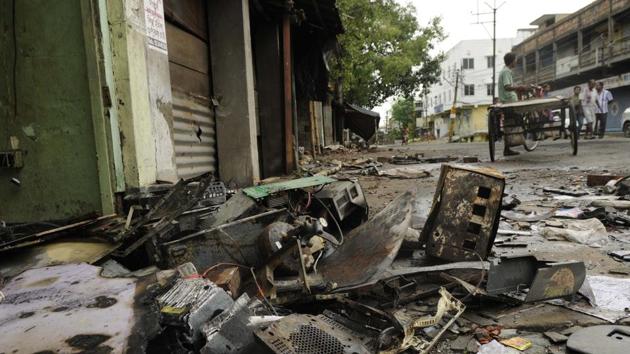Hindu-Muslim violence in Basirhat: Why is Bengal constantly on the boil? | HT analysis
Hindus in certain pockets have often been at loggerheads with sections of Muslims who constitute about 27% of the state’s population. But critics say the situation has worsened in recent times under CM Mamata Banerjee.
Basirhat of West Bengal is in the news for a continuing communal flare up that has left one person dead, dozens wounded and ties between Hindu-Muslim neighbours in tatters.

The situation is not uncommon though in the eastern state bordering Bangladesh. West Bengal has been rocked by communal violence intermittently, more so in recent months, raising fears that the state is turning into a communal tinderbox.
“Bengal has not witnessed so many communal clashes over such a short span. This is the dark age and it doesn’t fit into the image Bengal takes pride in,” says Amal Kumar Mukhopadhyay, a former principal of Presidency College. Facts bear out Mukhopadhyay’s argument. During the CPI(M)-led Left Front’s 34-year rule, the state witnessed communal violence that was few and far between. The past 11 months, however, have witnessed 11 communal clashes.
Hindus in certain pockets have often been at loggerheads with sections of Muslims who constitute about 27% of the state’s population. But critics say the situation has worsened in recent times under CM Mamata Banerjee’s tenure. “The situation was created after Mamata Banerjee came to power for the second time in 2016 and started appeasing one community. The results are evident,” alleges Jishnu Basu, south Bengal secretary of the RSS, the ideological parent of the BJP.
BJP is eyeing inroads into the state where it remains a fringe player at the moment . Commentators say it stands to gain by polarising the state and has therefore ratcheted up its rhetoric against Banerjee for partisanship. “They are out to fish in troubled waters with an eye on votes,” said a leader of Banerjee’s Trinamool Congress (TMC).
Banerjee has carefully cultivated her Muslim vote bank: she attends iftars and Muslim religious functions covering her head, has announced stipends for clerics, is known to actively promote Madrasas and is often seen sharing the stage at public functions with Muslim leaders.
Her pro-Muslim imagery has reportedly upset many in Bengal who already feel threatened by the influx of undocumented migrants from Bangladesh. Even PM Narendra Modi tapped into the fears when during the 2014 electoral campaign, he accused TMC government of “turning a blind eye” to the infiltration from Bangladesh, endangering the livelihood of the state’s people.
Though arch rivals, the CPI(M) is on the same page as Modi on this score.
“Communal violence will not stop in Bengal because the government has gone into denial mode. Or else, the chief minister wouldn’t have described the Basirhat violence as a ‘minor incident,” alleges CPI(M) politburo member and Lok Sabha MP Md Salim.
Banerjee denies being partisan and has asked for peace in the region. “To the government, all religions are equal. We believe in communal harmony and the need of the hour is to maintain it,” points out state urban development minister Firhad Hakim.
Even Muslim leaders deny the state administration is pro-Muslim. “Muslims have never been appeased. They got some jobs but not as many as claimed or believed. It’s true that the government built roads, provided potable water and set up hospitals in many areas. But even Hindus benefited from the projects,” says Pirzada Jiauddin Siddiqui of Furfura Sharif village in Hoogly.
But her political rivals insist she is only paying lip service. The violence also saw Hindus retaliating. “Failure of the police compels Hindus to protect themselves,” says Devdatta Maji, general secretary of Hindu Samhati.




